417 episodes


A dominant feature of religious life of the 20th century has been the centrality of the Yeshiva institution for intensive Torah study. The modern yeshiva is a direct byproduct of its antecedents in the Russian Empire of the 19th century. The old oligarchy which controlled Jewish communal life in Eastern Europe for centuries, was a combination of the rabbinical and financial elite. The personality of the Vilna Gaon and his legacy among Lithuanian Jews cemented the scholarly ideal of total dedication to Torah study and knowledge. His prime student established the first modern yeshiva in Volozhin, but it took decades until the idea really spread. Torah study for the most part continued as it always had in the Lithuanian region, in local yeshivos and batei medrash. Due to a confluence of external factors facing Russian Jewry in the closing decades of the 19th century, the Volozhin style yeshiva finally caught on and began to spread. The story of how the scholarly elite of Lithuania studied Torah and institutionalized the idea of the yeshiva, is an important chapter in the story of Jewish life in Czarist Russia of the 19th century. Enjoy earlier related episodes on this topic: 1. https://jsoundbites.podbean.com/e/the-legacy-of-the-vilna-gaon/ __ __ Cross River, a leading financial institution committed to supporting its communities, is proud to sponsor Jewish History Soundbites. As a trusted partner for individuals and businesses, Cross River understands the importance of preserving and celebrating our heritage. By sponsoring this podcast, they demonstrate their unwavering dedication to enriching the lives of the communities in which they serve. Visit Cross River at https://www.crossriver.com/ Subscribe to Jewish History Soundbites Podcast on: PodBean: https://jsoundbites.podbean.com/ or your favorite podcast platform Follow us on LinkedIn, Twitter or Instagram at @Jsoundbites For sponsorship opportunities about your favorite topics of Jewish history or feedback contact Yehuda at: yehuda@yehudageberer.com


The Czarist government implemented a policy of censorship of all published material in the empire, whether it was imported or printed locally. Though this was a general policy, there were unique particularities regarding the censorship of Jewish works. In the early years following the partitions of Poland, there wasn’t an effective mechanism of censoring in place, and it was only in 1826 when censorship for Jewish works was implemented in a systematic fashion. The government utilized the tool of censorship in order to assist in solving what they termed ‘the Jewish question’. Censorship of religious texts, especially those relating to Chassidic thought, mysticism and Kabbalah, was thought to distance them from sectarianism, integrate the Jews into Russian society, ‘improve’ them and make them more ‘productive’. An outsized role was played by the censors themselves, who were generally prominent maskilim or even apostates. Later in the century, the government shifted away from censorship of religious works, and focused on secular literature and the emerging media of newspapers and periodicals in Russian, Hebrew and Yiddish. These were considered a greater threat from the Czarist perspective as they encouraged Jewish nationalism, socialism, aspirations of emancipation and revolutionary activity. Cross River, a leading financial institution committed to supporting its communities, is proud to sponsor Jewish History Soundbites. As a trusted partner for individuals and businesses, Cross River understands the importance of preserving and celebrating our heritage. By sponsoring this podcast, they demonstrate their unwavering dedication to enriching the lives of the communities in which they serve. Visit Cross River at https://www.crossriver.com/ Subscribe to Jewish History Soundbites Podcast on: PodBean: https://jsoundbites.podbean.com/ or your favorite podcast platform Follow us on LinkedIn, Twitter or Instagram at @Jsoundbites For sponsorship opportunities about your favorite topics of Jewish history or feedback contact Yehuda at: yehuda@yehudageberer.com


In 1827 Czar Nicholas I implemented the military draft on the Jewish community of Russia as a means of integrating Jews into Russian society. The Jewish kahal was required to supply the young recruits, who then generally served for 25 years in the Czar’s army. The most infamous element of the draft was the cantonists. These were a select group of future draftees who were taken at a younger age to special cantonist brigades, where they underwent paramilitary training, and significant percentages of its ranks converted to the Russian Orthodox Church. The story of the cantonists in Czar Nicholas’s army has gone down in Jewish lore as one of the great tragedies of modern Jewish history. Through both fact and legend, the cantonists fate has come to define the troubled relationship between the Czarist government and the Jewish subjects of the Pale, as well as the points of tension and conflict within the Jewish community itself. Though the military reforms of Nicholas’s successor Czar Alexander II ended the cantonist draft and shortened the general military draft following the end of the Crimean War in 1856, the saga of the cantonists would haunt Jewish history for decades to come. Cross River, a leading financial institution committed to supporting its communities, is proud to sponsor Jewish History Soundbites. As a trusted partner for individuals and businesses, Cross River understands the importance of preserving and celebrating our heritage. By sponsoring this podcast, they demonstrate their unwavering dedication to enriching the lives of the communities in which they serve. Visit Cross River at https://www.crossriver.com/ Subscribe to Jewish History Soundbites Podcast on: PodBean: https://jsoundbites.podbean.com/ or your favorite podcast platform Follow us on LinkedIn, Twitter or Instagram at @Jsoundbites For sponsorship opportunities about your favorite topics of Jewish history or feedback contact Yehuda at: yehuda@yehudageberer.com


The cradle of the Chassidic movement was in the areas of the Polish Kingdom which were soon annexed to the Russian Empire during the partitions of Poland in the last quarter of the 18th century. This took place just as the nascent movement was spreading rapidly throughout these areas and beyond. Chabad in White Russia, the various branches of the Chernobyl and Ruzhyn dynasties in Ukraine, Karlin, Slonim, Apta, Savran, Breslov and many other smaller dynasties dotted the countryside across the Pale of Settlement. The Czarist government initially didn’t recognize the chassidim as a separate entity within the Jewish community, though the initial stages of legislation actually benefited the development of the movement. The opponents of the Chassidic movement – misnaggdim and maskilim, as well as the chassidim themselves, at times attempted to involve the government in their internal disputes. Later in the 19th century the Russian government specifically singled out Chassidic custom, dress and leadership, and the chassidim of Russia had to contend with the unique circumstances of their communities development within the greater context of the challenges of the overall Jewish community in the Pale of Settlement under the autocratic rule of the Romanovs. Cross River, a leading financial institution committed to supporting its communities, is proud to sponsor Jewish History Soundbites. As a trusted partner for individuals and businesses, Cross River understands the importance of preserving and celebrating our heritage. By sponsoring this podcast, they demonstrate their unwavering dedication to enriching the lives of the communities in which they serve. Visit Cross River at https://www.crossriver.com/ Subscribe to Jewish History Soundbites Podcast on: PodBean: https://jsoundbites.podbean.com/ or your favorite podcast platform Follow us on LinkedIn, Twitter or Instagram at @Jsoundbites For sponsorship opportunities about your favorite topics of Jewish history or feedback contact Yehuda at: yehuda@yehudageberer.com


The aftermath of the assassination of Czar Alexander II in 1881 was a watershed time period in Russian Jewish history. A reactionary phase led to the passing of the infamous May Laws which restricted Jewish life, and reversed many of the previous reforms. A series of violent pogroms broke out primarily in Ukraine and southern Russia in 1881-1884. There was a mass expulsion of Jews from Moscow and its environs in 1892, ostensibly because they were residing there illegally outside the Pale of Settlement. Further restrictions were promulgated by the reactionary government of Czar Alexander III concerning Jewish trade and commerce within the Pale. The autocratic reign of Czar Nicholas II during the years 1894-1917 were a time of upheaval for the Russian Empire as a whole, and a dark time for the Jews of Russia in particular. The Kishinev Pogrom in 1903 along with the government’s weak response in its prevention, strengthened antisemitic sentiment among the Russian people and government officials. Although Russian Jewry enjoyed limited reforms as a result of the failed Russian revolution of 1905, the bloody pogroms which accompanied it, caused a tremendous loss of life and property damage across the Pale. Jews participated in the electoral process of the newly established Duma, but the Czar and his government ministers continued to curtail any reform and issued further draconian restrictions on Jewish subjects. This culminated in the infamous Beilis Trial in 1913. Russian Jewry on the eve of World War I was battered and beaten, and seemed further away from emancipation than ever before. Cross River, a leading financial institution committed to supporting its communities, is proud to sponsor Jewish History Soundbites. As a trusted partner for individuals and businesses, Cross River understands the importance of preserving and celebrating our heritage. By sponsoring this podcast, they demonstrate their unwavering dedication to enriching the lives of the communities in which they serve. Visit Cross River at https://www.crossriver.com/ Subscribe to Jewish History Soundbites Podcast on: PodBean: https://jsoundbites.podbean.com/ or your favorite podcast platform Follow us on LinkedIn, Twitter or Instagram at @Jsoundbites For sponsorship opportunities about your favorite topics of Jewish history or feedback contact Yehuda at: yehuda@yehudageberer.com


From the time of the first partition of Poland in 1772, until the Russian Revolution in 1917, the Czarist Russian Empire was host to the largest Jewish population in the world. The generally antisemitic Romanov dynasty early on formulated solutions to what they referred to as the ‘Jewish question’. Based on the twin themes of subjugating the Jewish populace with a series of discriminatory and restrictive measures, while also attempting to integrate the Jews into the general population, the Czarist government fluctuated between the proverbial carrot and stick throughout the 19th century. Russian Jews were restricted to an area known as the Pale of Settlement, and under the reign of Czar Nicholas I the Jews were included in the 25 year military draft with many young Jewish children being drafted as cantonists. During the great reforms of Czar Alexander II following Imperial Russia’s defeat in the Crimean War, a practice of selective integration was implemented in an attempt to incentivize the acculturation of Jews into Russian society. The czarist policy was generally consistent in this regard until 1881. Cross River, a leading financial institution committed to supporting its communities, is proud to sponsor Jewish History Soundbites. As a trusted partner for individuals and businesses, Cross River understands the importance of preserving and celebrating our heritage. By sponsoring this podcast, they demonstrate their unwavering dedication to enriching the lives of the communities in which they serve. Visit Cross River at https://www.crossriver.com/ Subscribe to Jewish History Soundbites Podcast on: PodBean: https://jsoundbites.podbean.com/ or your favorite podcast platform Follow us on LinkedIn, Twitter or Instagram at @Jsoundbites For sponsorship opportunities about your favorite topics of Jewish history or feedback contact Yehuda at: yehuda@yehudageberer.com


World renowned posek of the 19th century, prolific author and courageous leader, Rav Shlomo Kluger (1785-1869) achieved immortality in the Torah world through his nearly half century tenure as Magid and Av Beis Din in the prominent Galicia town of Brody. As political and economic changes swept through the Habsburg Empire over the course of the 19th century, traditional norms changed, technological advances brought new challenges and the hegemony of the traditional Kahal (Jewish communal autonomy) was irrevocably transformed. Rav Shlomo Kluger emerged as a charismatic and strong minded leader during this tumultuous time. Halachic queries arrived at his desk from all over Galicia and eventually from across Europe. He fought to maintain tradition and halachic norms despite attempts to modernize Jewish law. His literary legacy is almost unparalleled in Jewish history, and his many works are studied until this very day. Cross River, a leading financial institution committed to supporting its communities, is proud to sponsor Jewish History Soundbites. As a trusted partner for individuals and businesses, Cross River understands the importance of preserving and celebrating our heritage. By sponsoring this podcast, they demonstrate their unwavering dedication to enriching the lives of the communities in which they serve. Visit Cross River at https://www.crossriver.com/ Subscribe to Jewish History Soundbites Podcast on: PodBean: https://jsoundbites.podbean.com/ or your favorite podcast platform Follow us on LinkedIn, Twitter or Instagram at @Jsoundbites For sponsorship opportunities about your favorite topics of Jewish history or feedback contact Yehuda at: yehuda@yehudageberer.com


As the architect of Orthodoxy in the modern era, Rabbi Samson Raphael Hirsch (1808-1888) has an outsized impact on the Torah world until this very day. In his own lifetime his leadership of German Jewry overall and in particular his own community of Frankfurt stemmed the tide towards secularization, and created a framework for a flourishing Torah community within modern life. His seminal works of The 19 Letters, Horeb, commentary on Chumash and hundreds of articles of his Collected Writings, formed the basis of his Torah outlook in the face of new challenges. Yet his influence wasn’t limited to his own lifetime or his own community in Frankfurt or Germany. His impact permeates the entire spectrum of 21st century Orthodoxy. He pioneered the use the vernacular in Orthodox rabbinic life, initiated the first Torah oriented newspaper, spearheaded the first Torah education for girls, and laid the groundwork for much of what is considered standard Orthodox practice and values in contemporary society. A nuanced examination of his imprint on contemporary Orthodoxy can serve as a reevaluation of the crucial role he played in modern Jewish history. Cross River, a leading financial institution committed to supporting its communities, is proud to sponsor Jewish History Soundbites. As a trusted partner for individuals and businesses, Cross River understands the importance of preserving and celebrating our heritage. By sponsoring this podcast, they demonstrate their unwavering dedication to enriching the lives of the communities in which they serve. Visit Cross River at https://www.crossriver.com/ Subscribe to Jewish History Soundbites Podcast on: PodBean: https://jsoundbites.podbean.com/ or your favorite podcast platform Follow us on LinkedIn, Twitter or Instagram at @Jsoundbites For sponsorship opportunities about your favorite topics of Jewish history or feedback contact Yehuda at: yehuda@yehudageberer.com


One of the leading halachic authorities of the 19th century, Rav Yechiel Michel Epstein (1829-1908) achieved immortality through his indispensable magnum opus Aruch Hashulchan. He grew up in Bobruisk in the Russian Pale of Settlement, and served for a decade as rabbi of Novozybkov, before assuming the helm of the prestigious Novardok community, where he’d serve as rabbi for the remaining 34 years of his life. Known far and wide as a decisive posek in all realms of halacha, many aspiring Torah scholars would come to him to request rabbinical ordination. Among his many projects was overseeing the development of the local Novardok yeshiva of Rav Yosef Yoizel Horowitz, the Alter of Novardok. The seminal work, the Aruch Hashulchan, was a bold endeavor to encompass all of halacha in a clear summary fashion. Undaunted by the daunting financial liabilities he’d ultimately encounter in order to facilitate the printing of the multi volume set, and despite the heavy hand of the Czarist Russian censors, he successfully published multiple volumes in his lifetime, and reaped the fruits of his labor as it became popular across the Jewish world. His legacy of leadership, as well as his enduring influence on the world of halacha remains until this very day. Cross River, a leading financial institution committed to supporting its communities, is proud to sponsor Jewish History Soundbites. As a trusted partner for individuals and businesses, Cross River understands the importance of preserving and celebrating our heritage. By sponsoring this podcast, they demonstrate their unwavering dedication to enriching the lives of the communities in which they serve. Visit Cross River at https://www.crossriver.com/ Subscribe to Jewish History Soundbites Podcast on: PodBean: https://jsoundbites.podbean.com/ or your favorite podcast platform Follow us on LinkedIn, Twitter or Instagram at @Jsoundbites For sponsorship opportunities about your favorite topics of Jewish history or feedback contact Yehuda at: yehuda@yehudageberer.com


After losing his family, community and yeshiva in Ponovezh, Lithuania during the Holocaust, Rav Yosef Shlomo Kahaneman (1886-1969), the Ponovezh Rav, endeavored to rebuild what was lost in the Land of Israel. He was a dreamer who carried out his vision with a zeal and energy which seemed superhuman. His crowning achievement was rebuilding the beloved yeshiva he lost in his hometown, by establishing the Ponovezh Yeshiva on a dusty hill on the outskirts of the small settlement of Bnei Brak. Today considered one of the key components of the flourishing postwar Torah world in Israel, the sprawling campus is a vibrant testimony to the Ponovezh Rav’s determination and perseverance. When it opened its doors at the end of 1943 with seven students, he dreamed of a building which would one day be home to hundreds of students. Rav Shmuel Rozovsky was hired as rosh yeshiva and Rav Avraham Abba Grossbard as mashgiach. The yeshiva soon expanded and Rav David Povarsky and later Rav Elazar Menachem Shach were added to the yeshiva faculty. The Ponovezh Rav felt that his energetic building campaigns were the expression of a living Holocaust memorial, as the Torah world of Lithuania would experience a rebirth in the Ponovezh Yeshiva, and its affiliate institutions. Listen to a previous episode exploring the life and accomplishments of the Ponovezh Rav: https://jsoundbites.podbean.com/e/builder-dreamer-the-unstoppable-vision-of-the-ponevezher-rav/ Cross River, a leading financial institution committed to supporting its communities, is proud to sponsor Jewish History Soundbites. As a trusted partner for individuals and businesses, Cross River understands the importance of preserving and celebrating our heritage. By sponsoring this podcast, they demonstrate their unwavering dedication to enriching the lives of the communities in which they serve. Visit Cross River at https://www.crossriver.com/ Subscribe to Jewish History Soundbites Podcast on: PodBean: https://jsoundbites.podbean.com/ or your favorite podcast platform Follow us on LinkedIn, Twitter or Instagram at @Jsoundbites For sponsorship opportunities about your favorite topics of Jewish history or feedback contact Yehuda at: yehuda@yehudageberer.com


A special place in Jewish history is reserved for the Machal fighters of 1948. These were primarily World War II veterans, who volunteered to fight for Israel during its War of Independence, and their participation served a key role in Israel’s victory. Comprised mostly of Jews, but included non-Jews as well, they formed the nucleus of Israel’s nascent air force, navy, and filled many specialized roles in the army. One of the most important members of this volunteer corps was Al Schwimmer, an American Jewish veteran who organized a group of pilots and experienced aviation personnel on Israel’s behalf. He also organized the purchase of planes for Israel’s Air Force, transported the planes to Czechoslovakia, and then used the planes to bring badly needed weapons and ammunition to fight for Israel’s survival. Cross River, a leading financial institution committed to supporting its communities, is proud to sponsor Jewish History Soundbites. As a trusted partner for individuals and businesses, Cross River understands the importance of preserving and celebrating our heritage. By sponsoring this podcast, they demonstrate their unwavering dedication to enriching the lives of the communities in which they serve. Visit Cross River at https://www.crossriver.com/ Subscribe to Jewish History Soundbites Podcast on: PodBean: https://jsoundbites.podbean.com/ or your favorite podcast platform Follow us on LinkedIn, Twitter or Instagram at @Jsoundbites For sponsorship opportunities about your favorite topics of Jewish history or feedback contact Yehuda at: yehuda@yehudageberer.com


In this final installment of ‘The Great Shanghai Escape’ series, we explore the story of the refugees stay in Shanghai during the war years. While integrating with the local Jewish community in Shanghai, the refugees remained there for the duration of the Japanese occupation until and even beyond the end of the war. Educational, religious and social institutions flourished, and the Mir Yeshiva settled into the Bais Aharon synagogue on Museum Road. Funding remained an issue throughout the war, and the refugees also had to sustain Japanese regulations, which included the ghettoization of Shanghai Jews towards the end of the war. Once the war was over, the next hurdle of finding a final destination took some time to overcome, as most refugees only left Shanghai a year or two later, primarily to the United States. The refugees who had escaped to Shanghai represent one of the most incredible rescue stories of World War II. Their miraculous escape from the Soviet Union to Shanghai, ultimately saved their lives, as they were spared the ravages of the Nazi Final Solution once the Nazis invaded the Soviet Union. Their journey and their story is unique in the annals of that era, and has thusly earned a special place in Jewish history. Cross River, a leading financial institution committed to supporting its communities, is proud to sponsor Jewish History Soundbites. As a trusted partner for individuals and businesses, Cross River understands the importance of preserving and celebrating our heritage. By sponsoring this podcast, they demonstrate their unwavering dedication to enriching the lives of the communities in which they serve. Visit Cross River at https://www.crossriver.com/ Subscribe to Jewish History Soundbites Podcast on: PodBean: https://jsoundbites.podbean.com/ or your favorite podcast platform Follow us on LinkedIn, Twitter or Instagram at @Jsoundbites For sponsorship opportunities about your favorite topics of Jewish history or feedback contact Yehuda at: yehuda@yehudageberer.com


The refugees stay in Japan lasted much longer than their brief transit visas had initially allowed for, with the imperial government allowing them to remain for several months. Though some refugees made it to the United States or other countries, most had nowhere to go. With the Japanese government commencing the operational planning for Pearl Harbor, they wished to rid the country of all foreign elements, and the refugee community was unceremoniously deported to Shanghai, China, under Japanese occupation, where they’d remain throughout the war. Many refugees were assisted by Professor Setsuzo Kotsuji, who later converted to Judaism. Others were assisted by the Polish ambassador to Japan Tadeusz Romer. The Jewish rescue activist Zorach Warhaftig continued to be active on behalf of the refugee community as well. The Dutch national Nathan Gutwirth was able to rescue a ship of 74 refugees who were missing documentation, by requesting assistance from the Dutch consul in Kobe, Japan, Nicolaas de Voogd. De Voogd provided the desperate refugees with Curacao visas, enabling them to arrive in Japan. Cross River, a leading financial institution committed to supporting its communities, is proud to sponsor Jewish History Soundbites. As a trusted partner for individuals and businesses, Cross River understands the importance of preserving and celebrating our heritage. By sponsoring this podcast, they demonstrate their unwavering dedication to enriching the lives of the communities in which they serve. Visit Cross River at https://www.crossriver.com/ Subscribe to Jewish History Soundbites Podcast on: PodBean: https://jsoundbites.podbean.com/ or your favorite podcast platform Follow us on LinkedIn, Twitter or Instagram at @Jsoundbites For sponsorship opportunities about your favorite topics of Jewish history or feedback contact Yehuda at: yehuda@yehudageberer.com
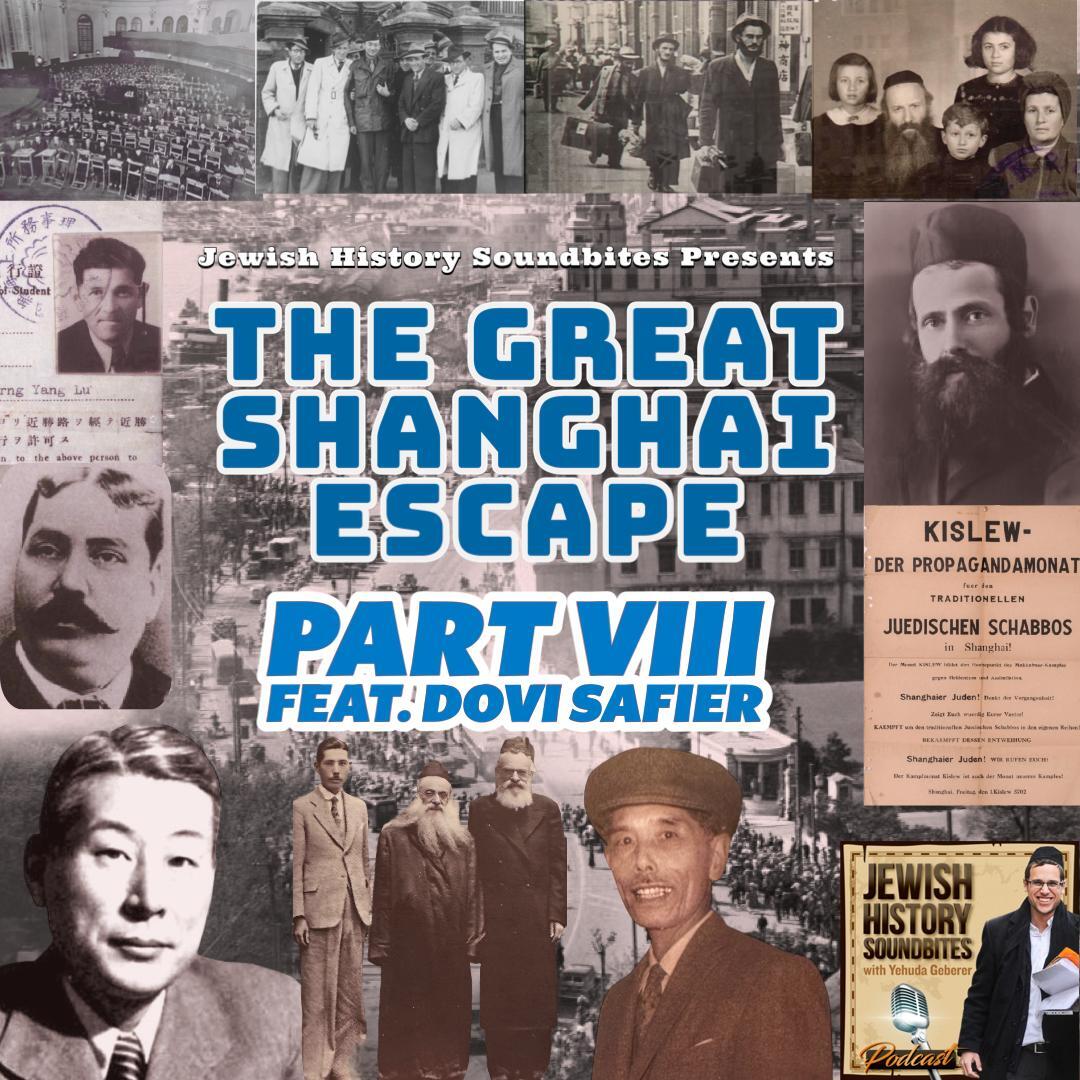

As part of our ongoing series about the Great Shanghai Escape, I had a conversation with my friend and collaborator Dovi Safier, who is a known expert on this topic, as well as having done some original research highlighting new angles of the narrative. Prior to getting to the topic at hand, our conversation covered recent history discoveries related to the family of the Slabodka Yeshiva, bearing witness to history, the recent rally in Washington, before we got to talking about the escape to Shanghai. We discussed the role of Rav Yitzchak Isaac Herzog in facilitating the escape and of Rav Avraham Kalmanowitz in funding the Mir Yeshiva and other rescue activities he spearheaded throughout his colorful career. The arrival of the refugees in Japan was another story we covered, including their reception by the local populace and the local Jewish community, despite the fact that anti-Semitic tropes were prevalent in the Japanese press. In order to create an even more authentic feel, Dovi inserted historic audio of eyewitnesses to some of the events described. Check out a previous episode of Jewish History Soundbites relating to the refugees sojourn in Japan regarding the debate surrounding the halachic International Dateline: https://jsoundbites.podbean.com/e/when-shabbos-was-sunday-the-international-dateline-controversy/ Cross River, a leading financial institution committed to supporting its communities, is proud to sponsor Jewish History Soundbites. As a trusted partner for individuals and businesses, Cross River understands the importance of preserving and celebrating our heritage. By sponsoring this podcast, they demonstrate their unwavering dedication to enriching the lives of the communities in which they serve. Visit Cross River at https://www.crossriver.com/ Subscribe to Jewish History Soundbites Podcast on: PodBean: https://jsoundbites.podbean.com/ or your favorite podcast platform Follow us on LinkedIn, Twitter or Instagram at @Jsoundbites For sponsorship opportunities about your favorite topics of Jewish history or feedback contact Yehuda at: yehuda@yehudageberer.com


The Soviets charged the refugees exorbitant fees for the exit visas and travel expenses. The Joint and the Vaad Hatzalah provided funds for these costs, with Rav Avraham Kalmanowitz investing herculean efforts to ensure the Mir contingent were able to fund their escape. Many refugees sold their personal belongings. They then embarked on a 10-12 day train journey on the Trans-Siberian Railroad across the vast expanses of the Soviet Union, arriving in the port city of Vladivostok. From there the Sea of Japan was crossed and the refugees settled temporarily in Kobe and Yokohama. The refugees received a generally warm reception from the local Japanese as well as the small local Jewish community. When it became evident that Curacao wasn’t going to be practical as a final destination, Japanese and Jewish activists interceded with the Japanese Imperial government to extend the refugee’s visas. As a result, the refugee community was able to remain in Japan for several months. Cross River, a leading financial institution committed to supporting its communities, is proud to sponsor Jewish History Soundbites. As a trusted partner for individuals and businesses, Cross River understands the importance of preserving and celebrating our heritage. By sponsoring this podcast, they demonstrate their unwavering dedication to enriching the lives of the communities in which they serve. Visit Cross River at https://www.crossriver.com/ Subscribe to Jewish History Soundbites Podcast on: PodBean: https://jsoundbites.podbean.com/ or your favorite podcast platform Follow us on LinkedIn, Twitter or Instagram at @Jsoundbites For sponsorship opportunities about your favorite topics of Jewish history or feedback contact Yehuda at: yehuda@yehudageberer.com


Once one was in possession of a destination visa, came the most challenging phase of the escape – applying for a Soviet exit visa. Applying for an exit visa from the ‘communist paradise’ was potentially requesting for a one way ticket to Siberia. Despite the risks involved, thousands of refugees applied, and miraculously received a visa. The entire process had to be funded, and refugees received funding from either the Joint, the Vaad Hatzalah or by selling their personal belongings. Cross River, a leading financial institution committed to supporting its communities, is proud to sponsor Jewish History Soundbites. As a trusted partner for individuals and businesses, Cross River understands the importance of preserving and celebrating our heritage. By sponsoring this podcast, they demonstrate their unwavering dedication to enriching the lives of the communities in which they serve. Visit Cross River at https://www.crossriver.com/ Subscribe to Jewish History Soundbites Podcast on: PodBean: https://jsoundbites.podbean.com/ or your favorite podcast platform Follow us on LinkedIn, Twitter or Instagram at @Jsoundbites For sponsorship opportunities about your favorite topics of Jewish history or feedback contact Yehuda at: yehuda@yehudageberer.com
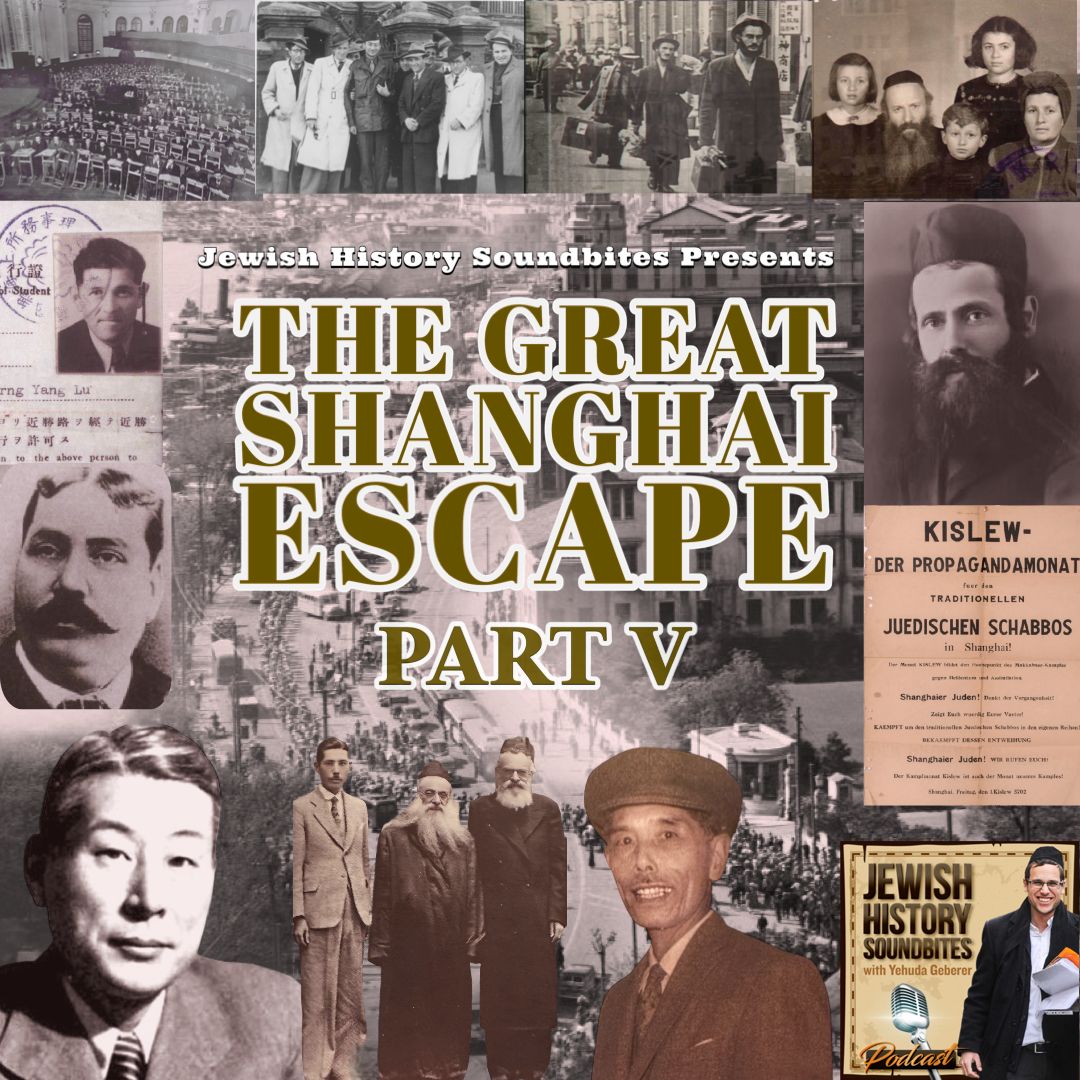

As thousands of Jewish refugees scrambled for Curacao ‘visas’ and Japanese transit visas, many others were skeptic regarding the visa scheme, while others thought it a downright dangerous maneuver. Not only were the Curacao visas dubious at best, but the very idea of applying for a Soviet exit visa was understood by many to be viewed as tantamount to criminal activity by the Soviet authorities. In the world prior to the Nazi invasion and the Final Solution, the greatest fear was deportation by the Soviet to Siberian gulag. Many advocated against applying for these visas due to the inherent dangers involved. Despite the opposition within the yeshiva community, Rav Leib Malin of the Mir Yeshiva encouraged the Mir contingent to apply for the visas as a group. Along with a few activists among the yeshiva students, the majority of the Mir Yeshiva students received Curacao and Japanese transit visas and prepared to join the throngs of Polish Jewish refugees headed for the east. Cross River, a leading financial institution committed to supporting its communities, is proud to sponsor Jewish History Soundbites. As a trusted partner for individuals and businesses, Cross River understands the importance of preserving and celebrating our heritage. By sponsoring this podcast, they demonstrate their unwavering dedication to enriching the lives of the communities in which they serve. Visit Cross River at https://www.crossriver.com/ Subscribe to Jewish History Soundbites Podcast on: PodBean: https://jsoundbites.podbean.com/ or your favorite podcast platform Follow us on LinkedIn, Twitter or Instagram at @Jsoundbites For sponsorship opportunities about your favorite topics of Jewish history or feedback contact Yehuda at: yehuda@yehudageberer.com
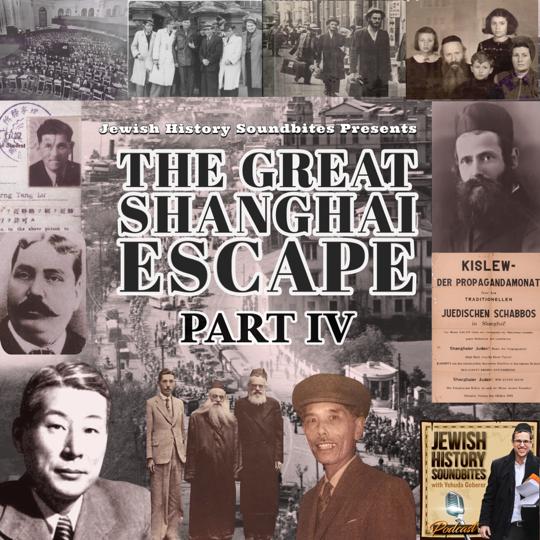

The summer of 1940 brought a measure of desperation in the search for visas in order to escape the clutches of the Soviet Union. Two Dutch citizens stranded in Lithuania independently contacted the Dutch consul in Riga LPJ de Decker, in order to seek his assistance in exiting the country. With Holland itself occupied by the Nazis since the previous May, it was thought to travel to the Dutch held island of Curacao. Ambassador de Decker informed Peppy Sternheim Lewin and Nathan Gutwirth that no visa was required for entry to Curacao, it was up to the discretion of the local governor to permit entry. De Decker was asked if the passport could be stamped with the words ‘no visa required for Curacao’ while leaving out the stipulation that the governor’s permission was required. De Decker authorized the honorary Dutch consul in Kovno, Jan Zwartendijk, to stamp passports in this fashion, and he even acquiesced a further request that this Curacao ‘visa’ even be issued for non-Dutch citizens. When rescue activist Zorach Warhaftig heard about the Curacao ‘visas’ he immediately spread the word among the refugee community, and thousands of Polish refugees lined up to receive the Curacao visas from Zwartendijk. With their end visa in hand, refugees proceeded to the Japanese consul in Kovno, where Chiune Sugihara issued the vital Japanese visas. Cross River, a leading financial institution committed to supporting its communities, is proud to sponsor Jewish History Soundbites. As a trusted partner for individuals and businesses, Cross River understands the importance of preserving and celebrating our heritage. By sponsoring this podcast, they demonstrate their unwavering dedication to enriching the lives of the communities in which they serve. Visit Cross River at https://www.crossriver.com/ Subscribe to Jewish History Soundbites Podcast on: PodBean: https://jsoundbites.podbean.com/ or your favorite podcast platform Follow us on LinkedIn, Twitter or Instagram at @Jsoundbites For sponsorship opportunities about your favorite topics of Jewish history or feedback contact Yehuda at: yehuda@yehudageberer.com


With the Soviet occupation of Lithuania in the summer of 1940, the search for visas to destination countries turned into a desperate endeavor for thousands of refugees who wished to escape a life under the communists. In order to execute an exit plan, one was required to be in possession of a full set of documentation attesting to every step of the intended journey. These included a passport, transit visas, end visas and perhaps most importantly, exit visas from the Soviet Union. Many debated the wisdom of obtaining visas, paying exorbitant sums for dubious visa destinations. Others were concerned that the Soviets would deport to Siberia anyone applying for an exit visa. Yet others took the risk. The great rescue activist and Zionist leader Zorach Warhaftig emerged as a central figure in pursuing any feasible visa venue. Soon the Mir Yeshiva joined the visa bandwagon and the visa miracles began to fall into place. Cross River, a leading financial institution committed to supporting its communities, is proud to sponsor Jewish History Soundbites. As a trusted partner for individuals and businesses, Cross River understands the importance of preserving and celebrating our heritage. By sponsoring this podcast, they demonstrate their unwavering dedication to enriching the lives of the communities in which they serve. Visit Cross River at https://www.crossriver.com/ Subscribe to Jewish History Soundbites Podcast on: PodBean: https://jsoundbites.podbean.com/ or your favorite podcast platform Follow us on LinkedIn, Twitter or Instagram at @Jsoundbites For sponsorship opportunities about your favorite topics of Jewish history or feedback contact Yehuda at: yehuda@yehudageberer.com


In this special bonus episode of Jewish History Soundbites, Dovi Safier and Seforim Chatter host Nachi Weinstein join me in discussing our article in Mishpacha Magazine about Rav Yonah ‘Minsker’, the famed Alter Mirrer who was killed by the Nazis and author of the newly republished Sefer Yonas Eilem. Our free flowing conversation covers some other topics as well. Subscribe To Jewish History Soundbites Podcast on: PodBean: https://jsoundbites.podbean.com/ or your favorite podcast platform Follow us on LinkedIn, Twitter or Instagram at @Jsoundbites For sponsorship opportunities about your favorite topics of Jewish history or feedback contact Yehuda at: yehuda@yehudageberer.com


As thousands of refugees streamed into Vilna in the fall of 1939, a humanitarian crisis ensued, with neither local authorities nor the local Jewish community capable of providing for the throngs of refugees. The situation was especially acute for the many impoverished yeshivos who had found refuge in neutral Lithuania. Rav Chaim Ozer Grodzinski was the revered leader of the Torah world and in his capacity as head of the Vaad Hayeshivos, personally shouldered the responsibility for their welfare. He turned to his trusted student Rav Eliezer Silver in Cincinnati, who in turn established a rescue organization on behalf of stranded Torah scholars stuck in Lithuania, which eventually came to be known as the Vaad Hatzalah. The Mir Yeshiva had by this time settled in the Lithuanian shtetl of Keidan, and for the next seven months attempted to return a sense of normalcy within the growing mayhem surrounding them. Over the summer of 1940, the Soviets occupied Lithuania and all illusions of that country remaining a safe haven were dissipated. The subsequently dispersed among four shtetls in the Lithuanian countryside, and it was from there that they visa search continued in earnest. Cross River, a leading financial institution committed to supporting its communities, is proud to sponsor Jewish History Soundbites. As a trusted partner for individuals and businesses, Cross River understands the importance of preserving and celebrating our heritage. By sponsoring this podcast, they demonstrate their unwavering dedication to enriching the lives of the communities in which they serve. Visit Cross River at https://www.crossriver.com/ Subscribe to Jewish History Soundbites Podcast on: PodBean: https://jsoundbites.podbean.com/ or your favorite podcast platform Follow us on LinkedIn, Twitter or Instagram at @Jsoundbites For sponsorship opportunities about your favorite topics of Jewish history or feedback contact Yehuda at: yehuda@yehudageberer.com
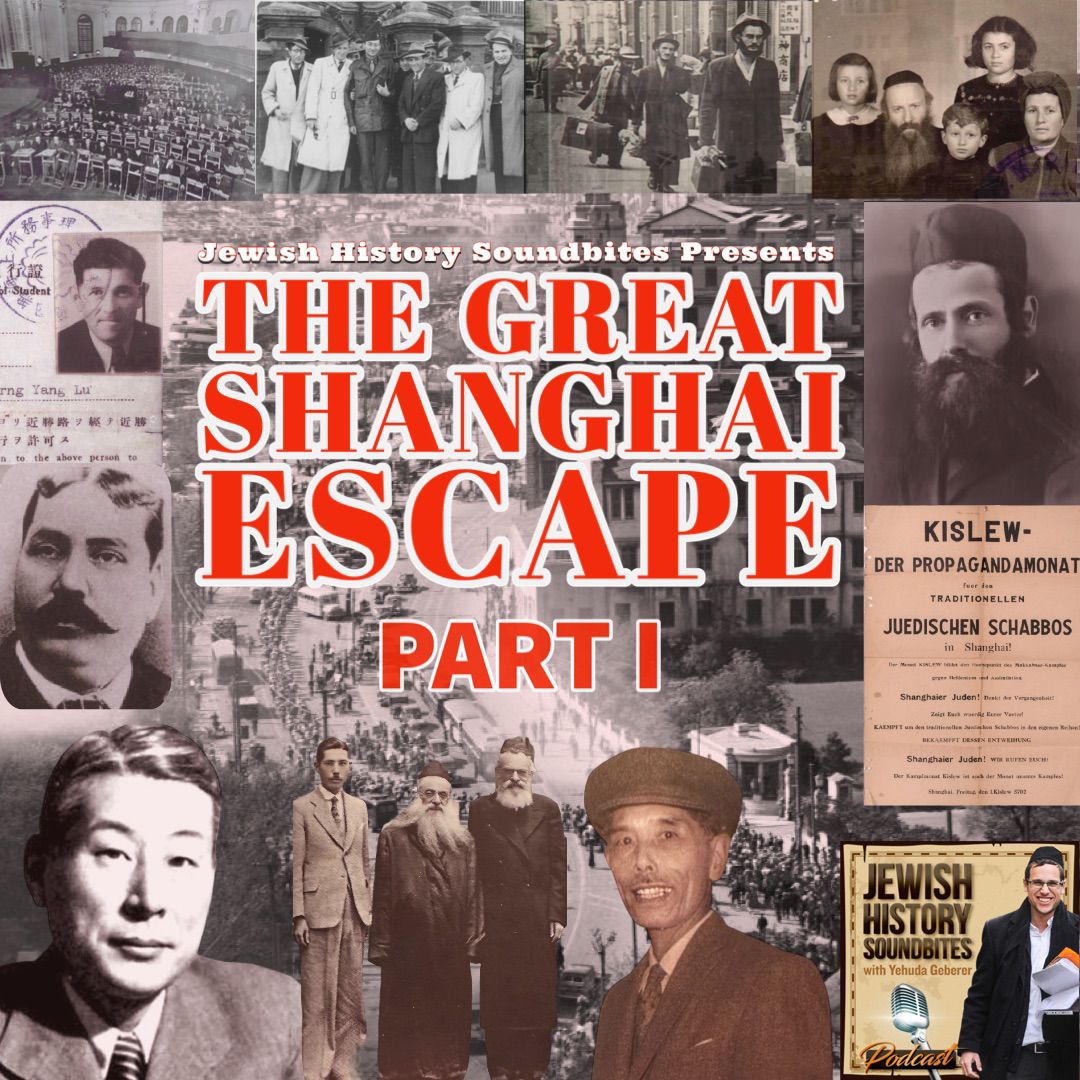

In this new series launched by Jewish History Soundbites, we’ll explore the story of the escape to Shanghai from war torn Europe during the early stages of World War II. Among the thousands of Jewish refugees who obtained visas was the Mir Yeshiva. This enabled them to traverse the Soviet Union, transit through Japan and ultimately spend the war years in Shanghai. Though this story is well known, it is often misunderstood, and this ongoing series will attempt to both clarify and organize the narrative, while dispelling some of the myths which have crept into the story over the decades. Part one of the series will open with the operational situation of Polish Jewry and specifically Mir Yeshiva on the eve of the war. The crucial geopolitical event from this time period is the signing of the Molotov-Von Ribbentrop Non-aggression pact between Nazi Germany and the Soviet Union, including a secret clause regarding the division of Poland. Following the invasion and occupation of eastern Poland, the Soviets returned the Vilna region to independent Lithuania, which appeared to many Polish refugees to be a temporary safe haven. Among the throngs of refugees headed to Vilna were many yeshivos, including the Mir. Cross River, a leading financial institution committed to supporting its communities, is proud to sponsor Jewish History Soundbites. As a trusted partner for individuals and businesses, Cross River understands the importance of preserving and celebrating our heritage. By sponsoring this podcast, they demonstrate their unwavering dedication to enriching the lives of the communities in which they serve. Visit Cross River at https://www.crossriver.com/ Subscribe to Jewish History Soundbites Podcast on PodBean: https://jsoundbites.podbean.com/ or your favorite podcast platform Follow us on LinkedIn, Twitter or Instagram at @Jsoundbites For sponsorship opportunities about your favorite topics of Jewish history or feedback contact Yehuda at: yehuda@yehudageberer.com


Jewish History Soundbites podcast is back after a long hiatus. Lots of great content, explorations of Jewish history and ongoing series will be posted on a consistent basis in the coming months. Stay tuned. The yahrtzeit of Rav Chaim Zanvil Abramovitz (c.1902-1995), the Ribnitzer Rebbe, is an opportunity to discuss the fascinating life and milieu of an individual who grew up in prewar Romania, survived the Nazis, defied the communists and lived out the final years of his long life in Israel and the United States. He somehow kept the flame of Judaism alive in postwar communist Romania, serving his community, and maintaining his personal ascetic practices such as utilizing the freezing Dniester River as a mikvah. His miraculous survival and leadership remains a legacy which continually grows, as his gravesite in Monsey attracts visitors and petitioners in the thousands. For sponsorship opportunities about your favorite topics of Jewish history contact Yehuda at: yehuda@yehudageberer.com Subscribe To Our Podcast on: PodBean: https://jsoundbites.podbean.com/ Follow us on Twitter or Instagram at @Jsoundbites You can email Yehuda at yehuda@yehudageberer.com
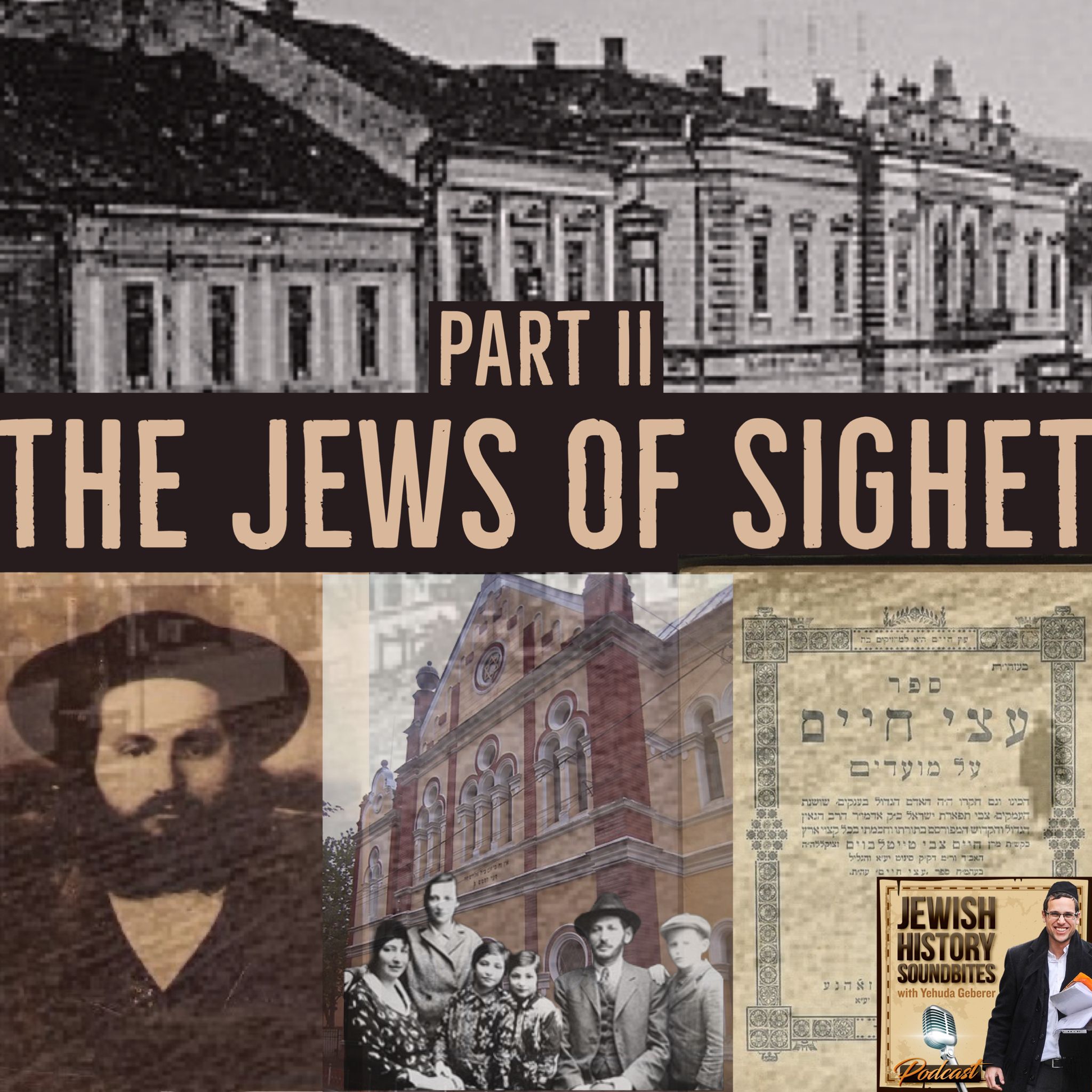

The Jewish history of Sighet is almost synonymous with its long line of rabbis from the Teitelbaum family. This rabbinic and chassidic dynasty dominated Orthodox life of Sighet for nearly a century prior to the community’s destruction in the Holocaust. It began with the son of the Yismach Moshe, Rav Eliezer Nisson Teitelbaum, and was later continued with his son Rav Yekusiel Yehuda, the famed Yetev Lev of Sighet who established the Sighet chassidic dynasty as well as founding and heading a prominent yeshiva in town. He in turn was succeeded by his son the Kedushas Yom Tov, and it continued with his oldest son the Rav Chaim Tzvi, the Atzei Chaim. Upon his untimely passing in 1926, his 14 year old son Zalman Leib was chosen to succeed his father, while the deceased’s brother Rav Yoelish Teitelbaum wasn’t offered a position in Sighet and would later gain renown as the Satmar Rav. Though the community was mostly wiped out during the Holocaust - poignantly described by Sighet native Elie Wiesel - there was a resurgence of the community in the postwar, and it was briefly led by the Atzei Chaim’s surviving son Rav Moshe Teitelbaum, the Beirach Moshe. For sponsorship opportunities about your favorite topics of Jewish history contact Yehuda at: yehuda@yehudageberer.com Subscribe To Our Podcast on: PodBean: https://jsoundbites.podbean.com/ Follow us on Twitter or Instagram at @Jsoundbites You can email Yehuda at yehuda@yehudageberer.com
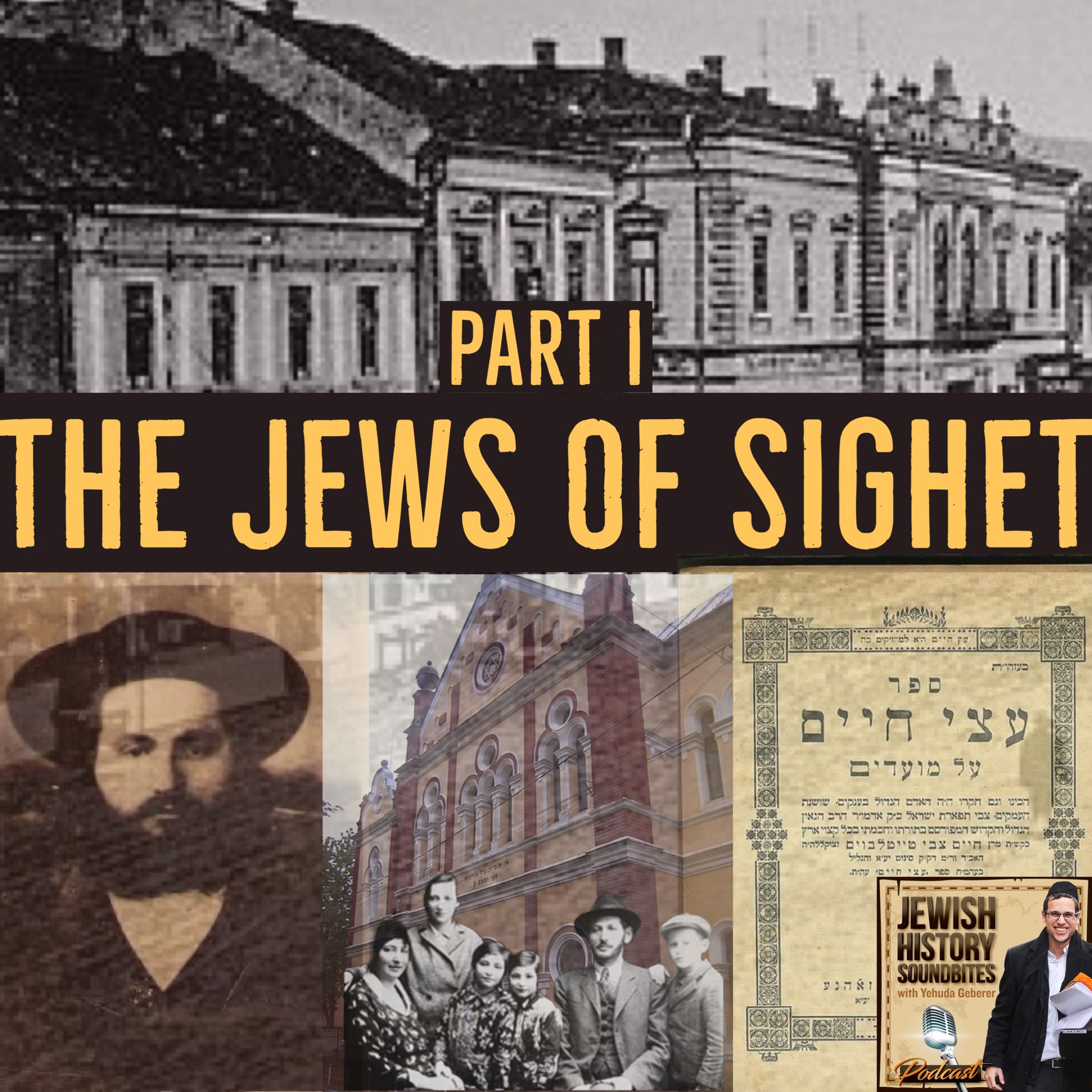

Though only settled in the 18th century and flourishing in the 19th, the town of Sighet made its mark on Jewish history and its legacy accompanies Jewish life until this very day. Nestled in the Maramaros district in Transylvania, it was sometimes in Romania, other times in Hungary and for a long time in the Austro-Hungarian Empire. By the end of the 19th century, its sizable Jewish population was one of the largest in Transylvania and also one of the few which was largely Orthodox. In the century before the war, Sighet was home to some prominent historic personalities, while left an imprint on Sighet Jewish life and the wider Jewish community. One of the earliest prominent rabbinical figures to settle in the Maramaros district was Rav Yehuda Kahana-Heller (1743-1819), known by his work the Kuntres Hasfeikos. The Kahana family would dominate Sighet communal life for the next century. Sighet is almost synonymous with the Teitelbaum dynasty, with a decisive impact on both Sighet’s Jewish history as well as beyond its borders across the Jewish world. For sponsorship opportunities about your favorite topics of Jewish history contact Yehuda at: yehuda@yehudageberer.com Subscribe To Our Podcast on: PodBean: https://jsoundbites.podbean.com/ Follow us on Twitter or Instagram at @Jsoundbites You can email Yehuda at yehuda@yehudageberer.com


Rav Yitzchak Aryeh (Zekl Leib) Vormser, known as the Baal Shem of Michelstadt (1768-1847) was a prominent rabbi and kabbalist, who lived in Germany in the 19th century. Having studied under Rav Nosson Adler in Frankfurt, he gained renown as a ‘Baal Shem’, someone who utilized kabbalistic formulas to heal petitioners and pray for their salvation. He also had a yeshiva in Michelstadt, and authored many Torah works, most of which were lost in a fire in 1825. In a rapidly secularizing German Jewish community, the Baal Shem of Michelstadt was the light of Kabbalah, and a leader who German Orthodoxy revered for decades to come. For sponsorship opportunities about your favorite topics of Jewish history contact Yehuda at: yehuda@yehudageberer.com Subscribe To Our Podcast on: PodBean: https://jsoundbites.podbean.com/ Follow us on Twitter or Instagram at @Jsoundbites You can email Yehuda at yehuda@yehudageberer.com
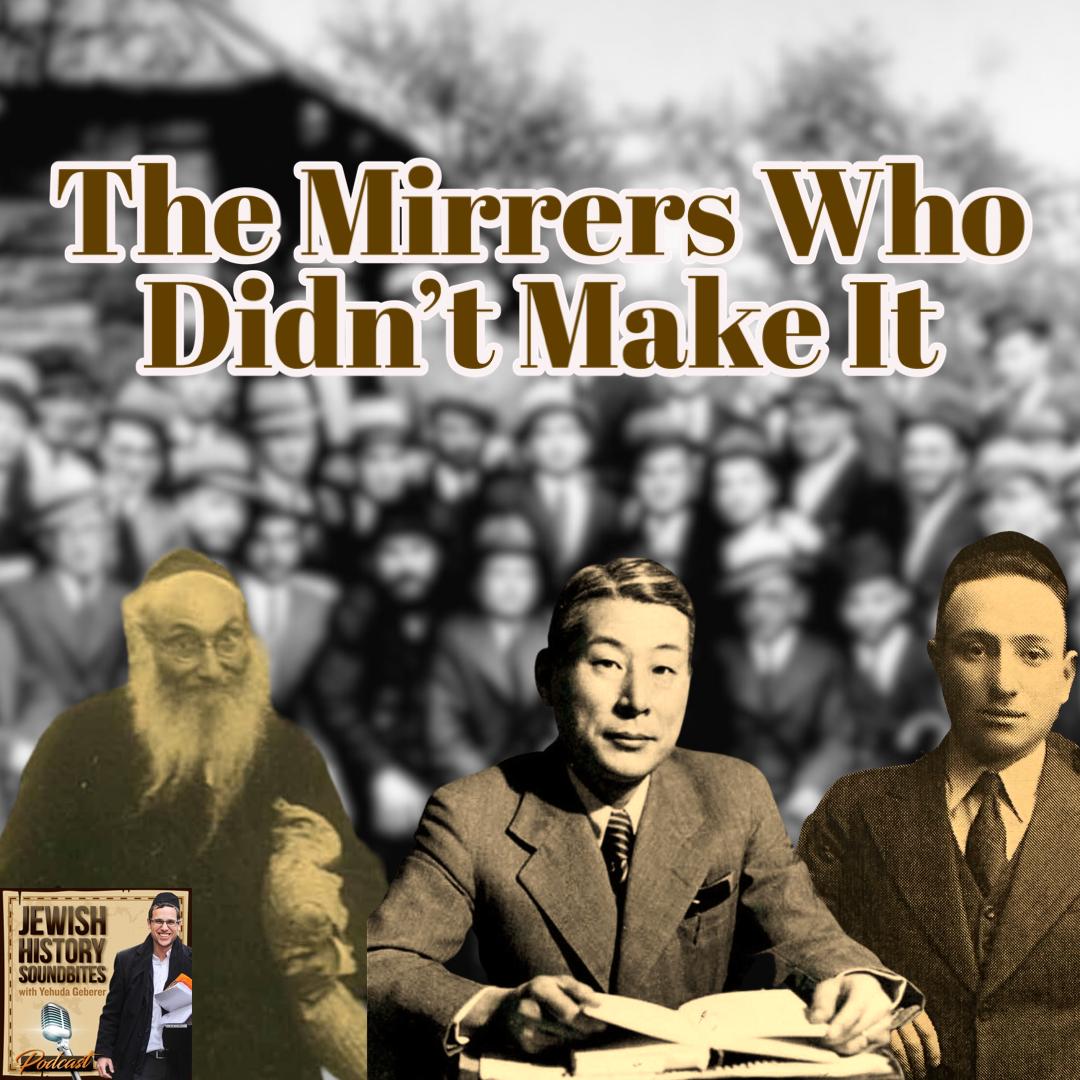

It’s well known that the Mir Yeshiva collectively and successfully escaped war torn Europe, being stranded first in Kobe, Japan, followed by a long exile in Shanghai, China. While mostly true, there were students who were unable for one reason or another to escape together with the yeshiva, and remained behind being martyred by the Nazis and their collaborators along with millions of their brethren. One of the prominent ones was Rav Yona Karpilov (Minsker). As a student of Rav Elchanan Wasserman and Rav Baruch Ber Leibowitz, he arrived in Mir in 1926 as a budding scholar, and soon emerged as one of the closest students of the Mir mashgiach Rav Yerucham Levovitz, as well as one of the yeshiva’s leaders guiding many of the younger students. He was also part of a contingent who studied in Brisk under Rav Yitzchak Soloveitchik, the Brisker Rav. Many theories have been presented as to why he didn’t succeed in obtaining one of the coveted Sugihara visas in the summer of 1940, but ultimately he was in Kovno the following summer and not in Shanghai with his friends. He was murdered by Lithuanian collaborators in 1941. This episode is sponsored by the OU. Make your Tish B'Av more meaningful with the OU. Renowned speakers, special programming, and live kumzits straight from the Kosel! For more information and to pre-register see below. https://go.ou.org/ejljxmkA To support the efforts to publish Yonas Eilem, the writings of Rav Yona Minsker Hy”d: https://charidy.com/yonasilem For sponsorship opportunities about your favorite topics of Jewish history contact Yehuda at: yehuda@yehudageberer.com Subscribe To Our Podcast on: PodBean: https://jsoundbites.podbean.com/ Follow us on Twitter or Instagram at @Jsoundbites You can email Yehuda at yehuda@yehudageberer.com


The challenging and nearly impossible situations confronting Jewish victims during the Holocaust presented many varied moral dilemmas. This episode will explore some of those stories and dilemmas faced by members of the medical profession - physicians, nurses and healthcare providers. In ghettos and camps, with a dearth of medical supplies and proper hygienic conditions, many rose to the challenge and continued to provide health care and attempted to save as many lives as possible under increasingly dire straits. Dr. Adina Swajger in the Warsaw Ghetto tried to provide care for children in the Jewish children’s hospital in the ghetto. When she realized she couldn’t save them, she decided to at least spare them the horrors of Treblinka. Dr. Gisele Perl performed abortions at Auschwitz in order to save the mother’s lives, and then spent the rest of her postwar career as a fertility specialist in order to bring more life into the world. Dr. Marc Dvorzhetzki served as a physician in the Vilna Ghetto and even in a concentration camp in Estonia towards the end of the war. And there are so many more. The dilemmas they faced, the heroic and selfless acts they courageously did to save others, can serve as a legacy to Jewish heroism in the face of Nazi atrocity. For sponsorship opportunities about your favorite topics of Jewish history contact Yehuda at: yehuda@yehudageberer.com Subscribe To Our Podcast on: PodBean: https://jsoundbites.podbean.com/ Follow us on Twitter or Instagram at @Jsoundbites You can email Yehuda at yehuda@yehudageberer.com
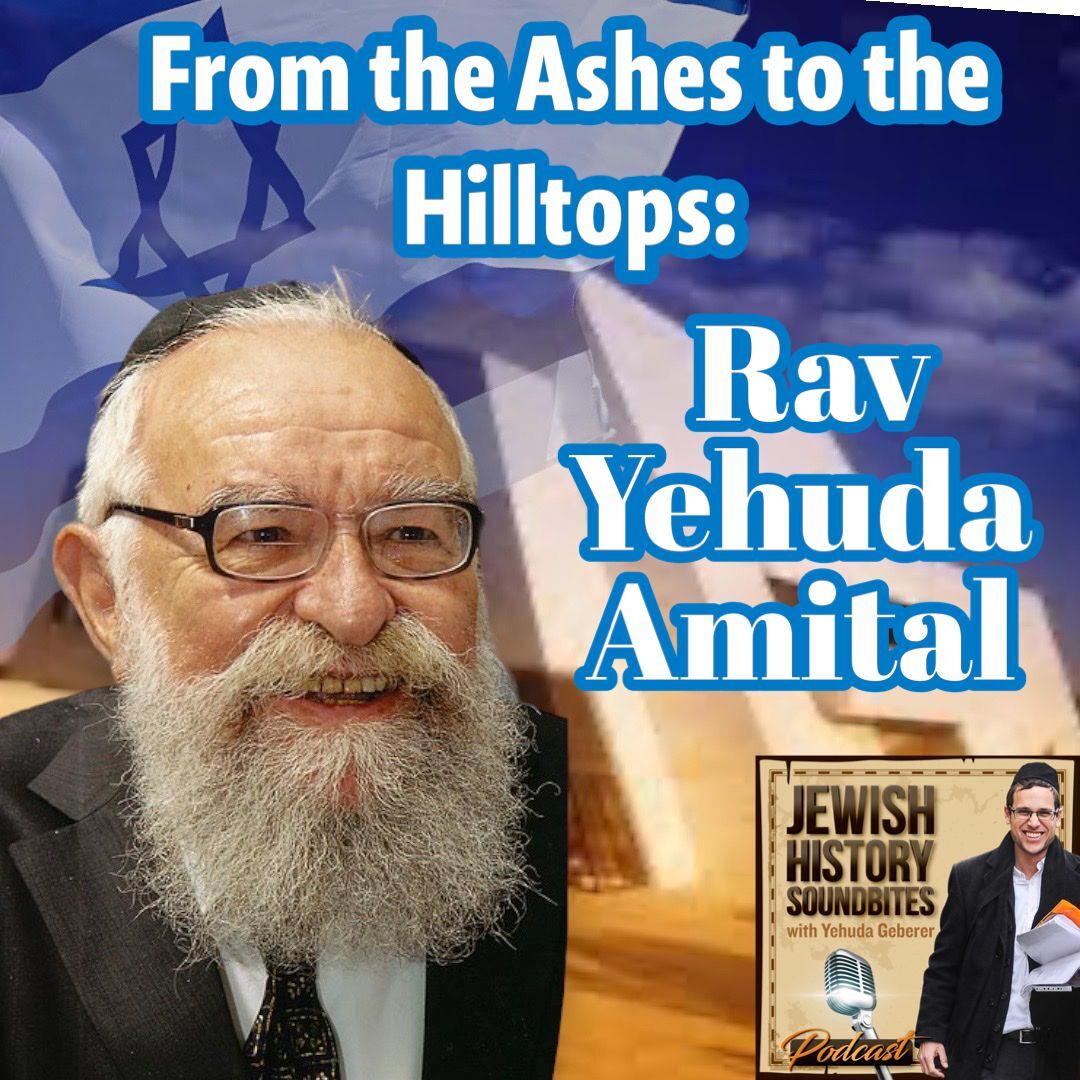

Rav Yehuda Amital (1924-2010) was a unique leader and builder of Torah of the 20th century. Born in Grosswardein, he survived the Holocaust and immigrated to the Land of Israel where he studied in the Chevron Yeshiva. While teaching at his father in law Rav Tzvi Yehuda Melter’s yeshiva in Rechovot he formulated the idea of the Hesder Yeshiva, through which the yeshiva students served in the military along with their yeshiva studies. Following the Six Day War he was hired to head the new Yeshivat Har Etzion in Gush Etzion. He remained at its helm for more than four decades. During the Yom Kippur War he lost eight students, and this tragic loss made a profound impact on him, coupled with his memory and view of the great destruction of the Holocaust. Later on in life, in addition to his yeshiva responsibilities, he publicly voiced his opinion on political issues. Though iconoclastic in many of his positions, he never hesitated to articulate what he felt needed to be expressed. For sponsorship opportunities about your favorite topics of Jewish history contact Yehuda at: yehuda@yehudageberer.com Subscribe To Our Podcast on: PodBean: https://jsoundbites.podbean.com/ Follow us on Twitter or Instagram at @Jsoundbites You can email Yehuda at yehuda@yehudageberer.com


Rav Moshe Sofer the Chasam Sofer (1762-1839) was both a leader and halachic decisor throughout his long rabbinical career. As he confronted a changing world where traditional Jewish life faced developing challenges of modernity, his vision, brilliance and sense of responsibility led him to utilize the halachic responsa he authored as a medium through which to express the traditional response through a continually evolving methodology. While still a young rabbi in Mattersdorf, the Chasam Sofer defended the local Frankfurt custom of his youth against the hegemony of a collective Ashkenaz identity. Yet a decade later as rabbi of Pressburg, he utilized the idea of collective Ashkenaz halachic identity following the rulings of the Ramah, as a mechanism for closing ranks around a strong traditional base in the wake of expansive attempts at reforming traditional halacha. During the last decade of the Chasam Sofer’s life, he expressed a pessimism regarding the future of rabbinical leadership as he witnessed many rabbis of his day leaning towards the reforming of halacha. His creative solution this time was to raise the banner of the Jewish communal collective, elevating the status of custom and rabbinic ordinance to the level of a Torah ordained obligation. The Chasam Sofer’s keen perception of the challenges facing traditional Judaism form the basis of his legacy until this very day. Check out our previous episodes on the life and leadership of the Chasam Sofer: Part 1: https://jsoundbites.podbean.com/e/hungarian-royalty-the-chasam-sofer-his-family/ Part 2: https://jsoundbites.podbean.com/e/chasam-sofer-part-ii-old-traditions-new-message/ Part 3: https://jsoundbites.podbean.com/e/chasam-sofer-part-iii-a-pressburg-situation/ Part 4: https://jsoundbites.podbean.com/e/chasam-sofer-part-iv-from-frankfurt-to-exile/ For sponsorship opportunities about your favorite topics of Jewish history contact Yehuda at: yehuda@yehudageberer.com Subscribe To Our Podcast on: PodBean: https://jsoundbites.podbean.com/ Follow us on Twitter or Instagram at @Jsoundbites You can email Yehuda at yehuda@yehudageberer.com
